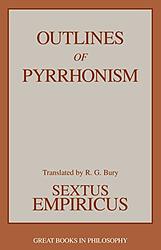Outlines of Pyrrhonism by Sextus Empiricus
"Outlines of Pyrrhonism" is a philosophical text that delves into the teachings of Pyrrho, a Greek philosopher known for his skepticism. The book explores the concept of skepticism as a pathway to "ataraxia" (tranquility), arguing that suspending judgment leads to a state of mental peace. It presents Pyrrhonism as a philosophy that encourages the suspension of judgment about the truth of beliefs in order to achieve this tranquility. The text also provides a detailed comparison of Pyrrhonism with other philosophical schools of thought, such as Stoicism and Epicureanism.
The 6956th greatest book of all time
- Published
- -180
- Nationality
- Greek
- Type
- Nonfiction
- Pages
- Unknown
- Words
- Unknown
- Original Language
- Ancient Greek
If you're interested in seeing the ranking details on this book go here
This book is on the following lists:
- The 100 Most Influential Books Ever Written (Martin Seymour-Smith)

